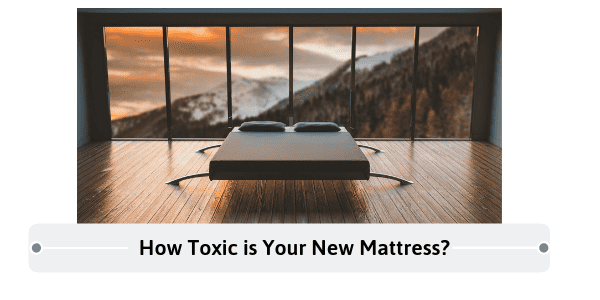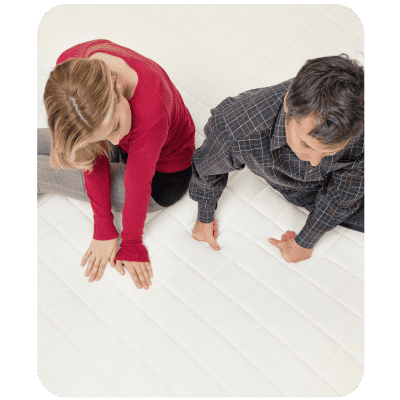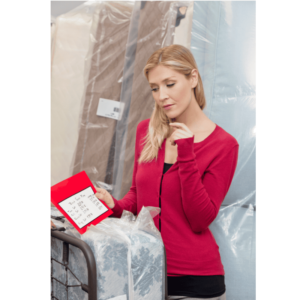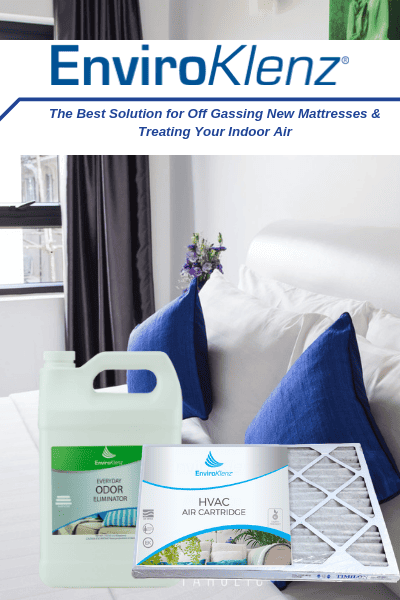Is Your New Mattress Off-Gassing Inside Your Home
Have you finally had it with your old mattress that is leaving you with aches and pains throughout the day? When your mattress reaches the end of its life, one of the first indicators that you will detect is aches throughout your body that we commonly associate with “sleeping weird” – however, this will be caused by the lack of support in your mattress instead of the awkward position in which you think you may have slept the night prior.
The options available to a consumer when purchasing a new mattress is endless – with different brands, materials, and styles of beds. The new phenomenon in mattresses is the “memory foam” material that many people are eagerly switching over to in pursuit of a one of a kind sleep. Although these memory foam mattresses are popular, they contain material and chemicals that can be potentially dangerous to human health upon exposure.
What should you know about memory foam before purchasing a new mattress and how can you successfully and safely speed up off-gassing from your new mattress?

What are Mattresses Made Of
Inside your mattress, there are a variety of materials and chemicals that are utilized during the production of the mattress. There are many materials used in your mattress that you may be aware of but there is also many that you would have never known exist inside the making of your bed. Below is the list of materials that are used to make up a mattress.
 Foam: The new “it” material for mattresses, foam is a soft movement-absorbing material that is designed to help with temperature regulation and relieving pressure points. There are a variety of different foam materials that are used, these foams include memory foam, gel memory foam, polyurethane foam, and viscoelastic foam. All of these foams, however, are composed of chemicals that can be hazardous to human health. The most hazardous of all of the types of foam is the polyurethane foam which is often referred to as the “egg crate” topper for mattresses. This type of foam is made with a petroleum base which is a major concern for pollution, along with a risk for VOCs that will create that unpleasant odor that one will smell upon the purchase of a new mattress.
Foam: The new “it” material for mattresses, foam is a soft movement-absorbing material that is designed to help with temperature regulation and relieving pressure points. There are a variety of different foam materials that are used, these foams include memory foam, gel memory foam, polyurethane foam, and viscoelastic foam. All of these foams, however, are composed of chemicals that can be hazardous to human health. The most hazardous of all of the types of foam is the polyurethane foam which is often referred to as the “egg crate” topper for mattresses. This type of foam is made with a petroleum base which is a major concern for pollution, along with a risk for VOCs that will create that unpleasant odor that one will smell upon the purchase of a new mattress.- Cotton: A very well-known material, cotton is used in mattresses for softness and padding. This material is a sustainable crop that is both durable and breathable, and naturally dust-mite resistant. Although cotton is commonly used, it does present certain health risks as this crop is heavily contaminated with pesticides during its development.
- Adhesives: An adhesive is used within your mattress to bond layers, materials, and seams together to create the perfect fit.
- Flame Retardants: Flame retardants are regularly used in the making of a mattress. Flame retardants are chemicals that are applied to materials in order to slow the start/ or even growth of a fire. Many mattress manufacturers apply this chemical onto the mattress material, and this can lead to exposure symptoms for humans when exposure to the flame retardants occur.
The Dangers of New Mattress Smell
When you receive your new mattress a smell can become emitted from the mattress into your home environment – this is typically described as a chemical-like smell that often accompanies the unboxing of a new mattress. This smell or odor is also often referred to as a “new mattress smell”, this is because it closely resembles a smell that is similar to the well-known “new car smell”.
The new smell of a mattress will develop overtime, as new mattresses are commonly pre-packaged in plastic wrapping before purchase which will lead to a breeding of chemicals and VOCs inside the tightly confined packaging. When the packaging of the new mattress is removed the odor will seep throughout the mattress and into your home in a process called off-gassing.
 Health Hazards of Off Gassing Mattress
Health Hazards of Off Gassing Mattress
The process of off gassing is when Volatile Organic Compounds (VOCs) leak out of upholstery materials and mattress foams and are released into the air you breathe. The chemicals and VOCs within this material start to emit into the air when at room temperature, turning the chemical into a gas that vaporizes inside the environment. The most commonly identified VOCs found within mattresses, that are later off gassed into the air include formaldehyde, toluene, chlorofluorocarbons, benzenes, trichloroethane, and perfluorocarbons. An amalgam of these chemicals off gassing together can result in a fairly toxic environment for human health.
Toxic Mattress Off Gassing Symptoms
According to the Minnesota Department of Health, they found that inhaling low amounts of VOCs over a period of time can increase the overall risk of cancer, central nervous system damage, and even kidney and liver damage. However, this is worst case scenario. The majority of people that are exposed to new mattress smell or off gassing of a mattress won’t experience any major side effects except for the occasional headache, nausea, and eye and throat irritation that can result in asthmatic symptoms.
How Long Does It Take to Air Out a New Mattress?
One of the first questions that someone may have when they purchase a new mattress is, “how long will it take to air out the ‘new mattress smell’?” That ‘new mattress smell’ is usually a temporary odor that overtime will dissipate from the material and eventually from your environment. The time span of this smell can last for a matter of days or even weeks! This is all dependent on the type of foam used, the density of the foam, and whether the mattress contains additional chemicals like flame retardants in its composition.
The worst of the off-gassing occurs within the first few hours of unwrapping your mattress, so it is recommended that you leave your windows open to help with the airing out of chemicals off-gassing from the mattress material.
Tips for Off Gassing New Mattress
There are several factors involved in removing or reducing mattress off-gassing in your home. The mattress itself, the air inside your home, and the surfaces that have been exposed to the volatile chemicals off gassing from the mattress material are all in need of chemical removal and deodorization. But how can this be done? We are going to go step-by-step on how to remove chemical off gassing odors and contaminants from your mattress, your air, and your surfaces.
 Mattress: As we discussed, mattresses are composed of an amalgam of chemicals, chemicals that are released into the air in a process called off gassing. When a new mattress enters your home and begins this process it is key to treat the source of the chemicals and chemical odors, which is the mattress itself. To successfully and effectively remove mattress chemicals from the material of the mattress you will need to utilize a chemical eliminating technology like EnviroKlenz. EnviroKlenz utilizes a patented technology that is able to effectively break down and eliminate a broad spectrum of chemicals and chemical odors from the surface. The EnviroKlenz Everyday Odor Eliminator can be safely applied to a mattress to eliminate the chemicals present on the fabric, as well as on other surfaces inside your home. Learn more about how to use the EnviroKlenz Everyday Odor Eliminator on your mattress, now!
Mattress: As we discussed, mattresses are composed of an amalgam of chemicals, chemicals that are released into the air in a process called off gassing. When a new mattress enters your home and begins this process it is key to treat the source of the chemicals and chemical odors, which is the mattress itself. To successfully and effectively remove mattress chemicals from the material of the mattress you will need to utilize a chemical eliminating technology like EnviroKlenz. EnviroKlenz utilizes a patented technology that is able to effectively break down and eliminate a broad spectrum of chemicals and chemical odors from the surface. The EnviroKlenz Everyday Odor Eliminator can be safely applied to a mattress to eliminate the chemicals present on the fabric, as well as on other surfaces inside your home. Learn more about how to use the EnviroKlenz Everyday Odor Eliminator on your mattress, now!
- Air: When off gassing occurs inside your home, the smell and odors will linger for quite an extended period of time after the introduction of the new mattress into the environment. This is due to the release of the chemical into the air, which can remain trapped inside for a number of reasons including poor circulation and ventilation inside the area. The best way to combat chemicals and VOCs inside your home’s air is to utilize an effective HVAC air cartridge in your air handling system. An HVAC can play a crucial role in trapping and breaking down chemicals and chemical odors that come into contact with the cartridge. Often times, we will find cheap HVAC Filters inside our homes and ensuring that we upgrade these filters to a high efficiency, chemical eliminating HVAC like the EnviroKlenz HVAC Filter will help to improve the overall air quality inside your home.
Comments
Post a Comment